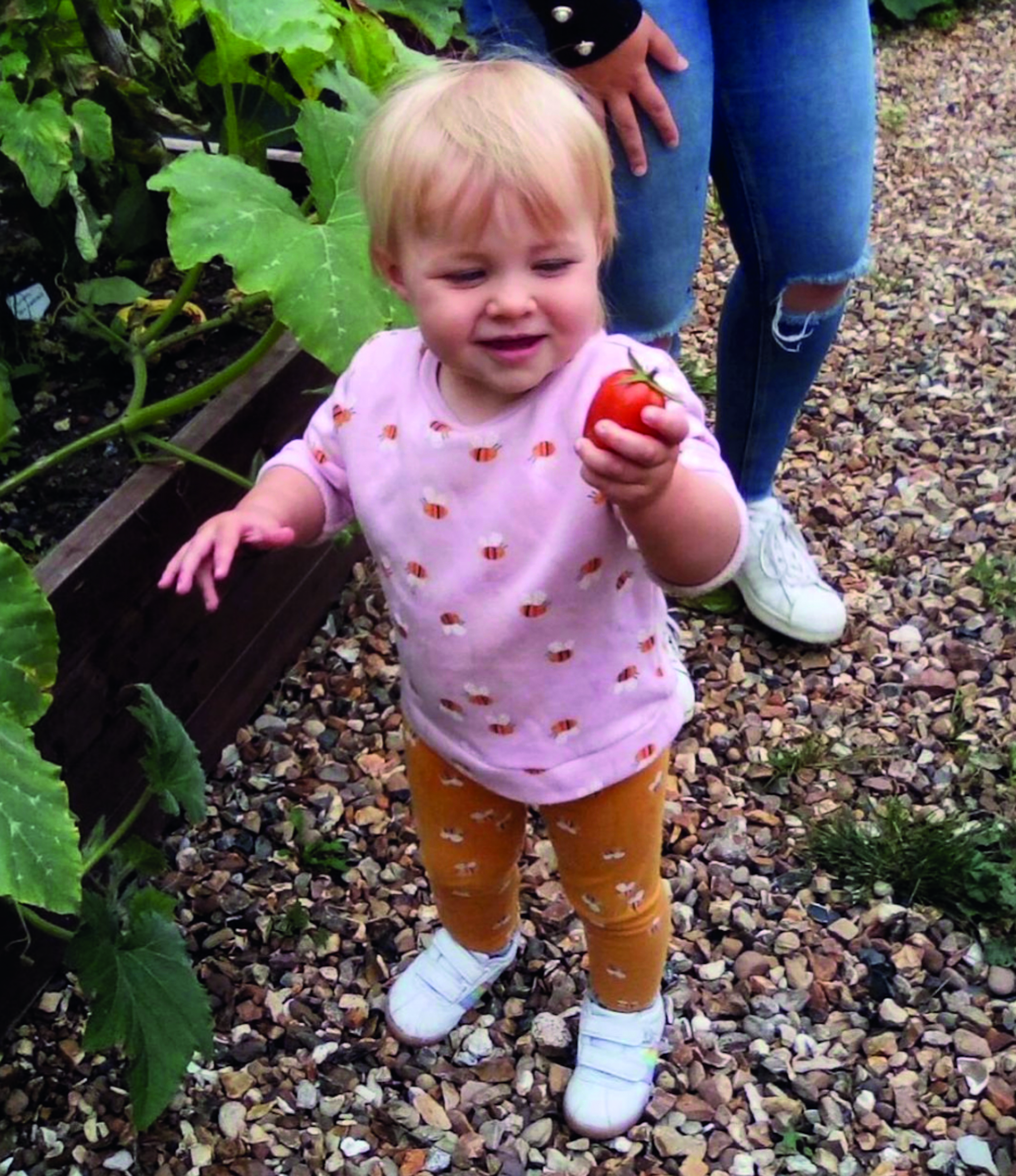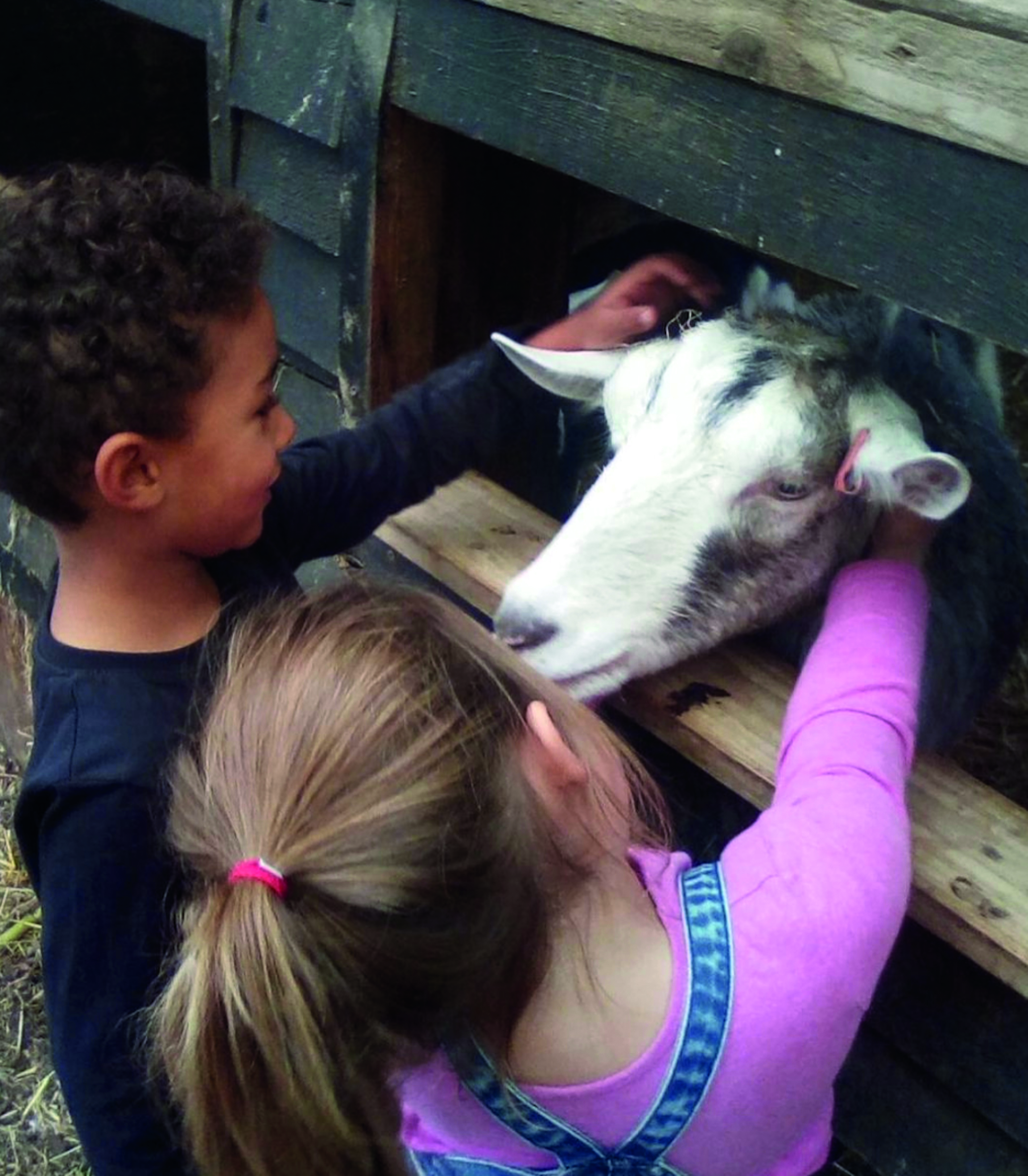
After three years working in an urban setting in Dubai, owner and manager of Meadow Lane Children’s Nursery in St Ives, Sophia Covill, was desperate to create a more back-to-basics ethos in her own nursery on her return to the UK.
‘I had this dream of opening somewhere where children could be outdoors and learn basic life skills,’ she explains. ‘It was a bit of an eye-opener when I was away that children weren’t being given the opportunity to do basic things like growing their own fruit and veg. That’s really where the idea originally started. My dad and brother found some farmland, and I thought it would be absolutely perfect for children to be outside and self-sufficient and able to learn some of those skills.’
Inspired by chef Jamie Oliver’s work on school dinners, Sophia was particularly keen to focus on nutrition in her new setting. ‘It really hit me how much we are missing teaching children the basics, while we’re so busy focusing on phonics and maths and all of that. For us, it’s about children who are happy in nature and who understand what the world does. It’s a big focus of what we do and, in turn, it’s done a huge favour for us, especially with Covid. Everybody suddenly wanted to be out in nature too, and we have seen how much that has done for mental health. We’ve definitely seen it have a huge effect on our staff, children and parents.’
The result is a three-time Nursery World Award-winning setting, following up its Enabling Environments Award win in 2020 with the Health and Well-Being and Eco-Friendly Awards in 2021.
NUTRITION
An on-site allotment encourages discussions about food and an appreciation of the natural world. ‘We grow everything from mint to beetroot, but the key is that it’s all seasonal,’ Sophia says. ‘That’s a big part of our education because the whole site changes from summer to winter. It’s important to understand that food isn’t always there.
‘Children are involved in absolutely every aspect of our kitchen garden, from planting the seeds down to pulling vegetables out of the ground. When I was at school, we had no understanding of where anything came from. Things were just popped on the plate in front of you and you were expected to eat them.’
An on-site farm including goats, geese, chickens, rabbits and guinea pigs encourages children to care for animals while also further helping them understand the provenance of their food, Sophia adds.
‘Two years ago, we actually used our pigs for meat, and pre-schoolers were involved in that process, which was interesting. It was all about giving children choice and helping them understand that animals can be food too,’ she says.

MEALTIMES
Children visit the nursery café for their daily meals. The large room features an open fire and tables laid by older children, complete with flowers from the nursery garden.
With 70 children in attendance, it can be tricky to manage mealtimes, but while meals are staggered, children all overlap with each other at various points to ensure they spend time together, observe and help one another, which in turn supports transitions.
‘The time taken for meals and conversation is a big part of ensuring a healthy relationship with food later in life,’ Sophia says. ‘I think we often don’t take into account the mental health side of eating. Giving children more choice and empowerment over their food and encouraging enjoyment of food is such a brilliant thing to start off a healthy relationship with food and avoid potential problems like eating disorders later in life.’
WELLBEING
Wellbeing is a priority for the management team, who are intentionally situated at the front of the nursery with no door to the office, in order to encourage staff and families to come in and have open conversations at any time.
‘We look after some children who live on farms and some who don’t have a garden,’ Sophia says.
While parents were unable to come into the setting in lockdown, seed- and book-swap boxes were set up in the entrance area where families could donate, swap or take seeds or books to encourage growing and reading at home.
If families had long periods away from nursery during the pandemic, they received ‘safe and well logs’ to fill in to keep in touch and help staff understand what support they could provide on the child’s return.

SAFE FORCEFIELD
But Sophia says the emphasis is on ensuring staff focus on the children, while senior management deal with families ‘behind the scenes’.
‘We try to create a safe forcefield for staff, so they tell us everything that is going on with parents and children, and then we deal with the parent interaction with regards to anything that might be something a bit more difficult, so staff can focus on the children,’ she says. ‘Whether that is sickness or issues at home, we take it all on so they don’t have to.’
Staff are encouraged to make suggestions about the everyday running of the setting, as well as to contribute their own interests and skills to the nursery community.
‘Every time we were interviewing staff members, we were hearing about negative experiences, which is really hard to hear about in childcare,’ Sophia adds. ‘I genuinely believe children’s wellbeing is down to how happy the staff are. We are very aware of how important it is that staff feel valued.’
In order to build links with the wider community and promote its wellbeing focus, the nursery’s pop-up farm shop opens twice a week to parents and members of the public. Children help prepare food such as jams and chutneys, as well as items such as soaps and candles. They also serve customers.
THE FUTURE
Following its award wins, the nursery plans to offer professional development opportunities to other settings. A recipe book based on its menus and a children’s book about the nursery cat are in the works. Other than that, the focus is on consolidation of good practice and the focus on health.
‘Everyone always asks if we are going to open another setting or expand, but we really don’t have to,’ Sophia says. ‘We’ve got to a stage where it’s really manageable, we’ve got a brilliant team, and we don’t often lose staff because they don’t feel under pressure. That’s a great place to be.’
Staff wellbeing
The nursery has a strong focus on ensuring staff’s mental and emotional wellbeing, with the management team having trained as mental health first-aiders to help support the 32 members of staff.
‘We feel a real responsibility having a team of predominantly young women, who stereotypically are more affected by mental health issues,’ Sophia Colvill says. ‘We want to support them each and every day.’
Staff Star Moments are awarded to members of the team who have gone above and beyond in their practice. Colleagues nominate staff to be recognised with a gift and a display in the staff room explaining the reason for their award.
A wellbeing station in the staff room provides practitioners with resources including calming balms, scents and oils, adult colouring books, self-help books, podcast recommendations and a well-being scrapbook for sharing feelings anonymously. Healthy breakfast options are also available and flower displays are regularly replenished. An outdoor staff eating area has been set up, and the bike and buggy park has been revamped to encourage staff to walk or cycle to nursery.









